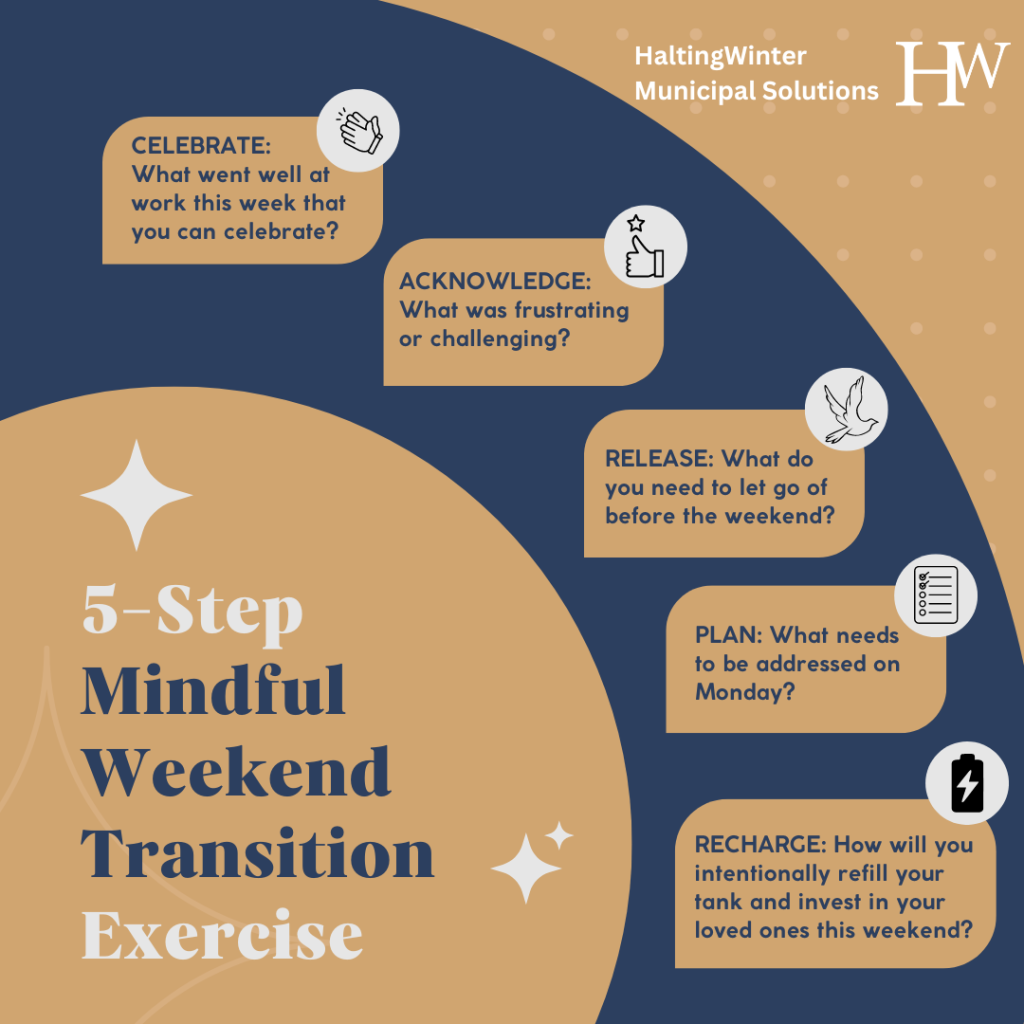Municipal Leaders: Develop Faster, Lead Stronger, Build Better

Every week, you’ll get insights and actionable steps to help you navigate personal growth and professional success.

As a city manager, you’re no stranger to the constant buzz of work-related thoughts. The nature of your role demands attention to detail, strategic thinking, and a commitment to your community that often extends beyond the typical 9-to-5. But what happens when this dedication starts to encroach on your personal time, leaving you mentally tethered to work even as the weekend arrives?
The challenge of “switching off” is real, and it’s one that many in leadership positions face. However, the ability to disconnect and recharge is crucial not only for your personal well-being but also for your effectiveness as a leader. This is where a simple yet powerful 5-minute exercise comes into play – a structured brain dump designed to help you transition from your professional responsibilities to your personal life.
Let’s break down this exercise into five key steps, each designed to address a specific aspect of your work-life balance:
Start by acknowledging your successes, no matter how small. Did you successfully navigate a challenging council meeting? Perhaps you implemented a new initiative that’s showing promising results? Or maybe you simply managed to clear your inbox before the weekend. Recognizing these achievements helps to end your work week on a positive note and reinforces a sense of accomplishment.
It’s equally important to acknowledge the challenges you faced. Was there a project that hit an unexpected roadblock? A difficult conversation with a team member? By identifying these pain points, you’re not dwelling on them, but rather acknowledging their existence so you can address them constructively when you return to work.
This step is crucial for mental decluttering. Identify the work-related thoughts or concerns that you need to consciously set aside. Remember, letting go doesn’t mean forgetting; it means choosing not to actively worry about these issues during your personal time. This could be anything from a pending decision to a minor disagreement with a colleague.
Briefly outline your priorities for when you return to work. This step helps prevent the “Sunday scaries” by giving you a clear starting point for the next week. Keep this list concise – perhaps the top three tasks you need to tackle. The goal is to create a sense of control, not to bring your entire to-do list into the weekend.
Finally, shift your focus to the weekend ahead. How will you spend your time to recharge? This could involve quality time with family, pursuing a hobby, or simply allowing yourself some unstructured downtime. The key is to be intentional about it. Plan activities that genuinely rejuvenate you and strengthen your personal relationships.
By taking just a few moments to reflect on these questions, you’re setting yourself up for a more balanced and fulfilling weekend. This practice offers several key benefits:
Try to make this exercise a regular part of your Friday routine. Set aside 5-10 minutes at the end of your workday to go through these steps. You might find it helpful to write down your responses, either in a journal or a digital note-taking app.
Remember, the goal isn’t perfection. Some weeks, you might find it challenging to identify successes or to let go of certain concerns. That’s okay. The value lies in the practice itself – in taking the time to reflect and consciously shift your mindset as you transition into your personal time.
As leaders in your communities, your well-being has a ripple effect. When you’re well-rested and recharged, you’re better equipped to serve your city and inspire your team. So, I encourage you to give this exercise a try. Implement it this Friday and see how it impacts your weekend.
I’d love to hear about your experiences. How did this exercise affect your ability to disconnect from work? Did you notice any changes in your stress levels or your enjoyment of the weekend? Share your thoughts in the comments on our LinkedIn page. Let’s support each other in finding that crucial balance between our demanding roles and our personal lives.
Remember, taking care of yourself isn’t selfish – it’s an essential part of being an effective leader. Here’s to more rejuvenating weekends and a healthier work-life balance for all of us in city management.
Seth Winterhalter is President of HaltingWinter Municipal Solutions, dedicated to making stronger cities through stronger leaders. Through executive coaching, consulting, and the Municipal Leadership Development Circle (MLDC), HaltingWinter helps city managers and municipal leaders transform their leadership impact and their organizational culture.
